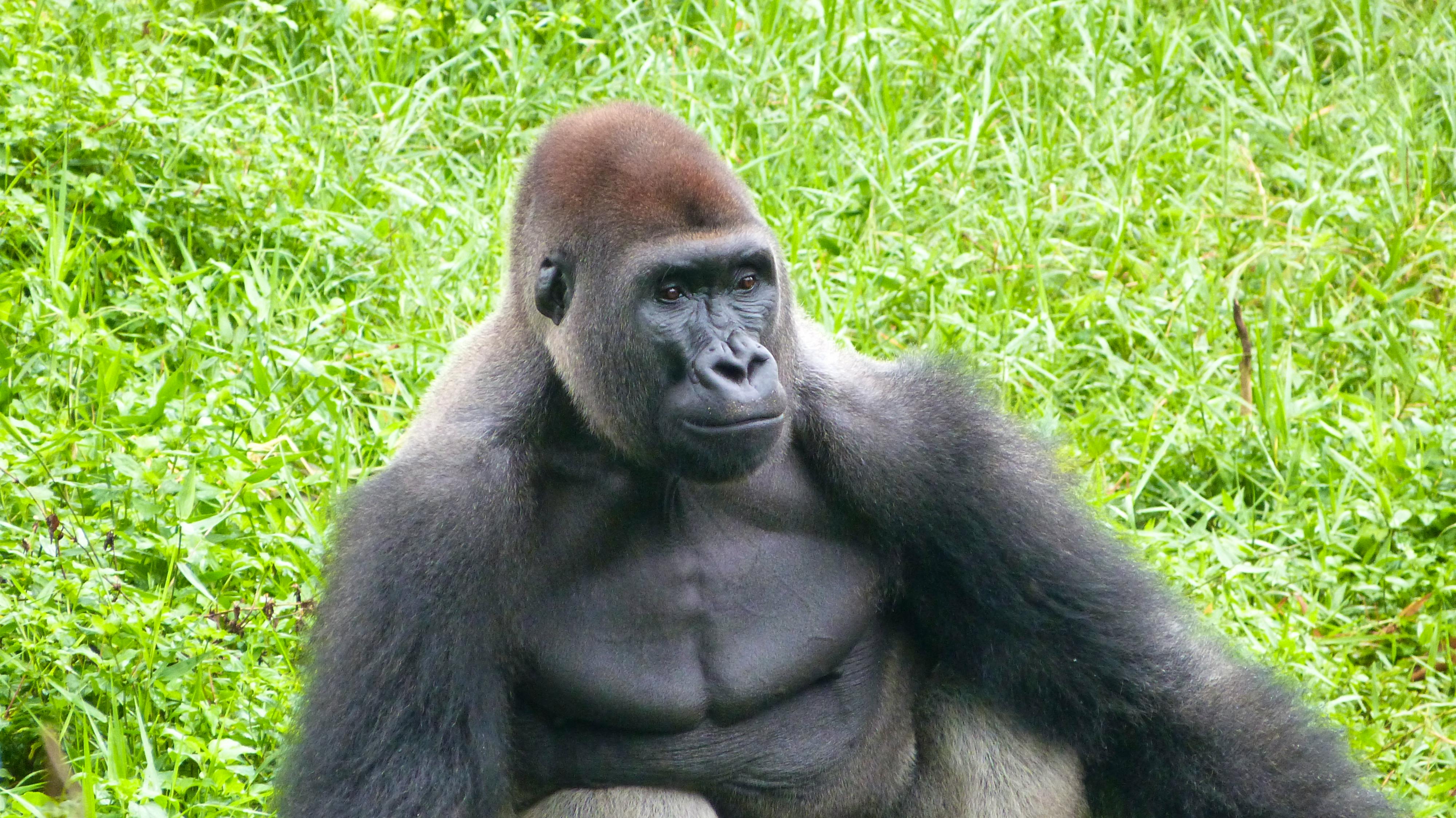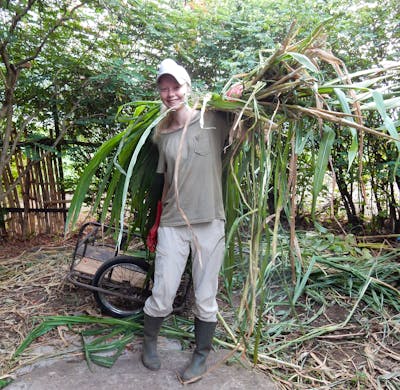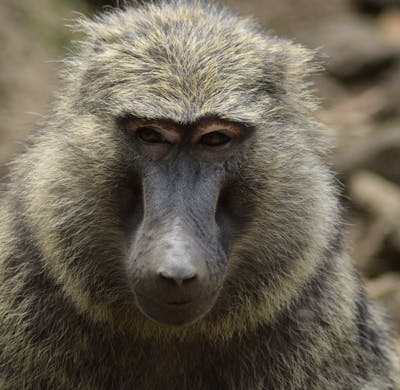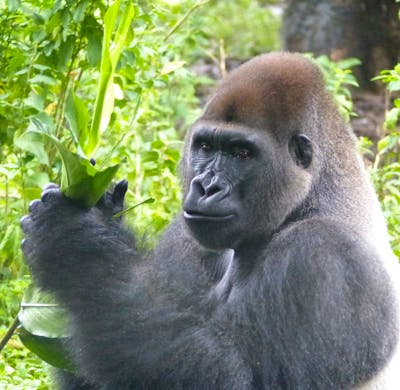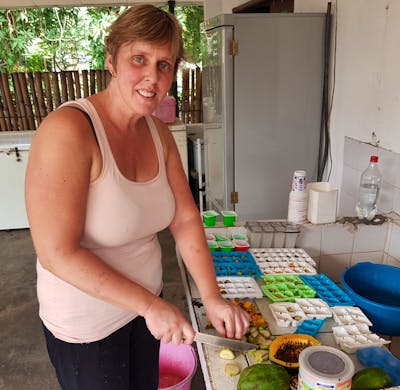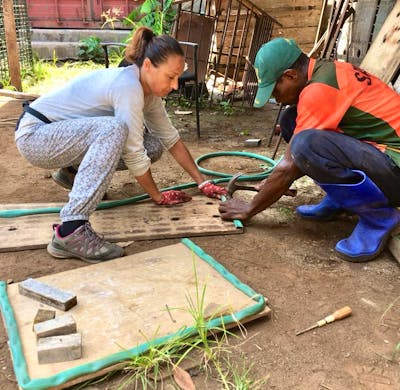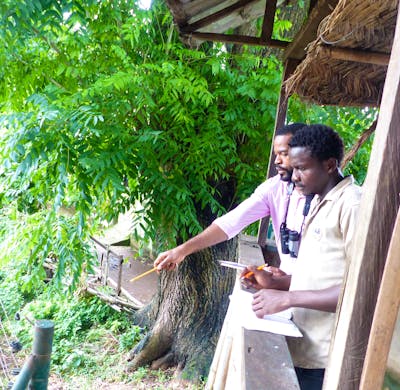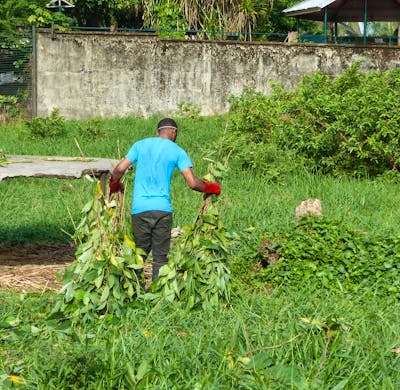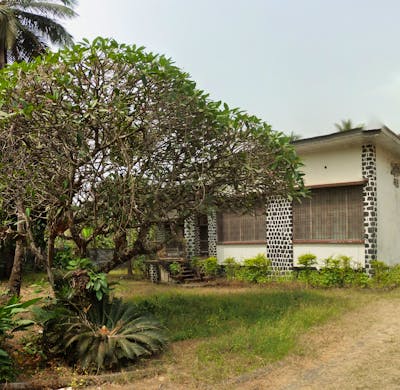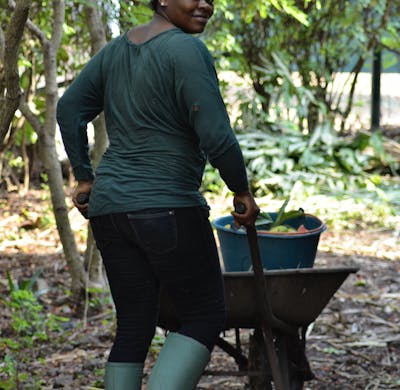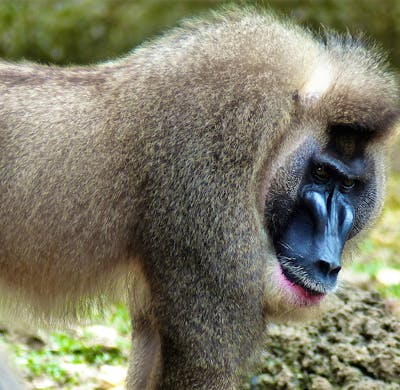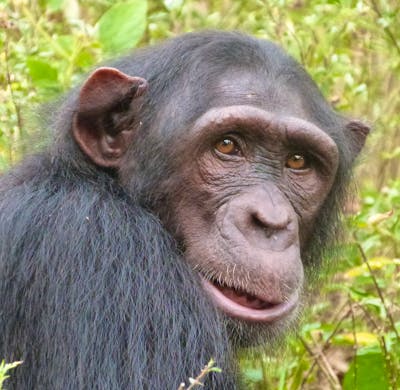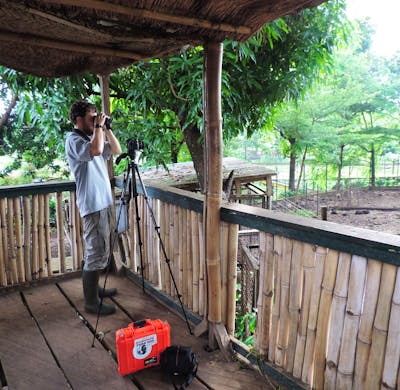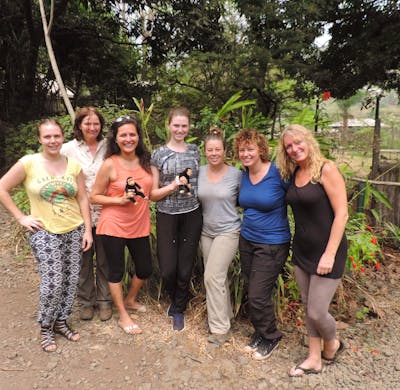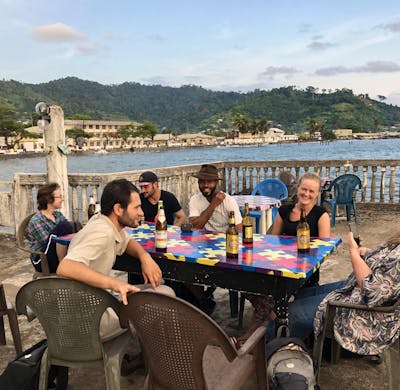The basic volunteer job is one of an assistant animal keeper. This will involve shadowing our keepers during their daily tasks (cleaning cages, preparing food, monitoring animals, preparing enrichment, repairing climbing structures, etc...). The LWC houses many species and each species has its own section. However, depending on your field of expertise or interests you can, at the discretion of the management, become involved in other areas too, such as our education program, the veterinary care of the animals, enclosure construction projects etc... The work is physically demanding and often dirty. There are numerous rules which volunteers must follow.
While volunteering at the centre, it is important to remember that most of the animals were a victim of illegal poaching, captured as innocent youngsters and their mothers often brutally killed before their eyes. Most were subjected to a harsh, cruel and lonely life before being rescued by the LWC where they can now enjoy a rich nutritional diet, large enclosures and the company of their own species, resulting in good health, both physically and psychologically. In addition to this we would like to highlight that all funds received from volunteers go directly to paying for animal care at LWC.
Since its start in 1993, the LWC has rescued more than 4,500 animals of various species. Although we focus on primate rescue and rehabilitation, we accept all species that arrive as a result of confiscation by authorities or surrender by individuals.
The Limbe Wildlife Centre is a conservation and rehabilitation centre, and our aim is to one day release the animals in our care. If you are expecting to interact directly with animals (touching, petting), this project is not for you. For the welfare of the animals in our care, we have very strict rules regarding animal interaction and you may be asked to leave the project if these rules are broken.
Currently we care for 15 species of primates:
- Central and Nigeria-Cameroon chimpanzee
- Western lowland gorilla
- Drill
- Mandrill
- Olive baboon
- Agile mangabey
- Red-capped mangabey
- Mona monkey
- Moustached guenon
- Crowned monkey
- Preuss monkey
- Two subspecies of putty-nosed monkey
- Red-eared monkey
- Tantalus monkey
- Patas monkey
In addition, we care for a variety of non-primate species, including:
- African grey parrot
- Home’s hinged tortoise
- Black hinged terrapin
- Serrated tortoise
- Bay duiker
- Bushbuck
- African civet
- Dwarf crocodile
- Nile crocodile
- And others....
Quarantine
All new volunteers are expected to do a 3 day quarantine period when they arrive in Limbe. You can still explore the bustling seaside town of Limbe and Cameroon, but whilst the COVID-19 pandemic is ongoing we want to protect our animals and our staff.
Working Days 1 -3:
All new volunteers are required to work in the animal food preparation area/kitchen. This not only gives volunteers the chance to learn and
understand the importance of nutrition at the LWC, but also allows management to ensure that each new person is in good health before
coming into contact with the animals.
Working Days 4 - 13:
You will be allocated to a section in which to shadow a keeper.
The five sections are as follows:
1. Guenons and mangabeys
2. Drills, mandrills and baboons
3. Chimpanzees
4. Gorillas
5. Quarantine
Whilst working in each section, you must ensure that you carefully follow the guidelines given by the keeper you are working with. Do not approach animals unless you are given permission.
Days 14+:
After completing all five sections you will have the opportunity to discuss with the head keepers any areas you are particularly interested in. Depending on the needs of the centre at that time, the head keepers will try to offer you the opportunity to work in the area(s) of your choice.
There may also be the opportunity to participate in our education programme depending on what time of year you volunteer. Our programme runs from October - March.
Health and Safety Rules
Remember that the LWC’s primary goal is to restore the health and natural behaviours
of animals rescued from poaching and illegal trafficking so that they can later survive
back in the wild. There are many infectious diseases which can be transmitted
between the animals at the LWC and humans. Inappropriate behaviour from humans
is the main risk factor that can cause serious sickness in both volunteers and animals.
It can also cause not only the outbreak of diseases, but also stress in the animals and
serious injuries to people.
It is extremely important that you follow all the rules of the LWC management. Failure
to do so can result in your removal from the volunteer program. Pandrillus reserves the
right to shorten or terminate any volunteer period if management is dissatisfied with a
volunteer’s performance (including unsafe, disrespectful, impolite, aggressive, or
discriminative behaviour).
Volunteer Rules
As a volunteer, you must:
- Always follow the guidelines given by the keeper for each section.
- Never open or close any enclosure doors, padlocks, sliding doors without keeper
instruction and supervision.
- Never approach an animal without a keeper’s instruction. Remember: just because
an animal may be safely approached by its keeper, doesn’t mean that the animal is
safe to be approached by someone else. Each animal has different relationships with
different people and may be unpredictable around someone they don’t know.
- Do not lean up against or stand too close to animal enclosures.
- Never stand close to a food box, as it allows animals to easily grab you.
- If an animal spits or throws objects at you, do not react. A reaction, either positive
or negative will only reinforce the behaviours.
- Do not stare at the animals: staring is often considered to be a hostile gesture by
primates and may lead to aggressive behaviours and actions.
- Be aware of where all your cleaning materials (such as a brush, gloves, buckets,
hose pipe) are always located. Animals love to steal and play with them. Make sure
you rinse all cleaning materials and place them back in the appropriate storage site
after cleaning.
- Stay in the section where you are assigned for the day. You are not allowed to go
to other sections without keeper supervision.
- In the event of an escape, volunteers must go to the entrance of the centre where
they will receive further instructions. Do not approach an escaped animal or attempt
to assist with its capture.
- For the safety of both volunteers and animals, animals must only be handled by
authorized staff, unless otherwise stated by the management. Do not touch any
animal, unless instructed to by keepers or management.
- Volunteers who wish to travel outside of Limbe must ask for approval from
management and sign a discharge of responsibility form for the LWC. The LWC is not
responsible for volunteers if they choose to travel at any time during their volunteering
period.
- You must follow the schedule made by the Head Keeper which will be placed on
the board (where morning meetings are held). If for any reason you are not able to
follow the schedule on any given day, the supervisor must be notified in advance.
- All photos and videos taken at the LWC will be considered the property of the
LWC. If you decide to share or post a photo or video on a social site or network, send
it first to the Fundraising and Communications Manager who will give you the green
light or not. It is strictly forbidden to take pictures of animals in cages (especially
selfies!), as the LWC has already been the victim of scandals due to photos that were
circulated without context and misinterpreted.
- The use of alcohol, drugs or any other controlled substances by employees and
volunteers is prohibited during working hours. Illegal drug taking is entirely prohibited
and will result in removal from the volunteer programme.
- Do not leave the centre during working hours without informing a Head Keeper. In
the event of an escape or other emergency, it is important that the staff know where
you are.
- Do not start a sexual relationship with any of the staff working at the centre.
- Please understand that the number of foreigners is very limited in Limbe, and
therefore the inhabitants are aware that you are affiliated to the LWC. You therefore
become a representative of the LWC, and any wrongdoing by a volunteer, even
outside the walls of the sanctuary, can be used against the LWC. It is therefore important that you behave appropriately outside of the wildlife centre when exploring
Limbe.
- At all times, please be responsible and recognize the importance of the safety and
hygiene rules for the wellbeing of both the animals and you by carefully reading and
agreeing to the LWC safety protocol. No liability on the part of Pandrillus shall arise
whatsoever.
Flights to Cameroon
You will need to fly to Douala airport. We do not recommend landing late in the night or on a Monday. Please avoid using Air Maroc and Turkish Airlines.
We will arrange airport pick up but at an additional cost.
Health requirements for working with animals at the LWC
Once you have been approved for volunteering for the time you would like to come,
you can start sending the following:
- Negative TB (tuberculosis) test: contact a health authority to make an
appointment for this test in most cases you will get a blood test, sometimes it
will require an x-ray
- Negative HIV test: you can ask for this test at your doctor, or in some cases you
can have the test posted to your home address
- Health check: you must complete a health check with a doctor – we need to
know what your general medical condition is, as well as if you have any
allergies or use any specific medications
Other health requirements
Vaccinations
If you do not have all your vaccinations yet, make sure you go to a health clinic and
get advice on which vaccinations you need. You may require multiple vaccinations
(check online). The required ones are yellow fever, typhoid and hepatitis A and B, plus
DTP (diphtheria, tetanus and polio). Some of these vaccinations may require multiple
injections, so it is a good idea to start them well before you plan to depart. Always
make sure the proof of your yellow fever vaccination is on the first page of your health
book – you will need to show this document to the authorities at the airport.
Prophylaxis against malaria
Other health requirements
Vaccinations
If you do not have all your vaccinations yet, make sure you go to a health clinic and
get advice on which vaccinations you need. You may require multiple vaccinations
(check online). The required ones are yellow fever, typhoid and hepatitis A and B, plus
DTP (diphtheria, tetanus and polio). Some of these vaccinations may require multiple
injections, so it is a good idea to start them well before you plan to depart. Always
make sure the proof of your yellow fever vaccination is on the first page of your health
book – you will need to show this document to the authorities at the airport.
Prophylaxis against malaria
Always ask a health clinic for their advice concerning malaria prophylaxis. We
generally advise not to take them too long (more than three months) because of the
side effects, but the final decision is up to you and your doctor. Another option is to
take Thiamine. Thiamine is vitamin B1 and it is a natural tablet. You can get it at a
pharmacy, and it is not too expensive. There are almost no side effects from this tablet.
Malaria is very common in Cameroon, but it is also easily treatable.
Administration papers
Once your application has been accepted, you can send the following:
- Copy of insurance papers - make sure you check your insurance policy on
volunteer work and working with animals and ask your provider if they can give
you a copy of your insurance or a letter stating that you are covered for
working with wild animals. Your insurance must also consider that Limbe is within
a crisis region. Check with your government to see their advice on travel to
Limbe and make sure your insurance papers reflect the risk of travel to Limbe.
- Copy of your passport
- Copy of proof of yellow fever vaccination
- Copy of your flight ticket - there are several different flight companies and
different times of arrival, but try to avoid arriving late at night (even though one
of our trusted taxi drivers will pick you up, it is safer to drive during the day or
evening)
Necessary equipment and materials
We advise you to bring the following items:
- Enough work clothes that cover
the body appropriately
- Walking shoes
- Mosquito net (optional)
- 2 to 3 towels
- Flashlight/headlamp
- Swimming clothes
- Mosquito repellent spray
- Sun cream
- Hat/cap
- Flip flops or sandals for the home
- Light clothing and shoes for the
house and nice outfits for outings
in Limbe (shorts, mid-thigh
dresses and tank tops are not
frowned upon in Cameroon)
- Rainwear (if staying between
May and October)
- Rain rubber boots (which you
can buy on site if you wear size
40 or more / size 7 or more for
English sizes)
- Warm clothing for the rainy
season and for excursions to
higher altitudes
- First aid kit
- Box of surgical or reusable masks
- Latex gloves
- Adapter for French sockets
- Rapid COVID-19 tests
- Euros of dollars to change money
or a bank card that works
internationally to take out money
from the ATM
- Donations for the centre (if you
have space in your luggage
please ask for a donations
request list)
- Optional: a hammock to rest
outside your room
Keep in mind that Limbe is often very wet, and you will be working outdoors in dirty
conditions. It may take clothes a few days to dry, and any clothing you wear at work
may become stained or damaged.
Life in Limbe
The LWC is in the town of Limbe in the Southwest Province of Cameroon, about an
hour and a half from Douala (the nearest city and airport). Limbe is a growing port
city (especially through refugees from the crisis), with about 100,000 inhabitants. The
people of Limbe are friendly and the city offers a botanical garden, bars, restaurants,
and a comfortable general atmosphere. The beaches around the city (not in the
centre) are beautiful and perfect for swimming. However, the ecology and
maintenance of the city is not a priority for the Cameroonian government: expect to
see streets, beaches, and the sea itself littered with rubbish and wrecks.
BE CAREFUL!
The climate can be extremely hot and humid and can be uncomfortable to work in.
Dry season is from November – May during which the temperatures are very high, and
it gets very humid. From June – October it rains a lot, and the temperatures go down
slightly. Working days are long and physically demanding. Being in a tropical country
there are many insects around. Living conditions are very basic.
Safety in Limbe
Limbe is a nice place to live, and people are generally friendly and helpful. However,
as in all other places, you should always be careful and aware of your safety.
For your safety in Limbe, we ask that you follow these safety rules:
- Always exercise caution while moving around, especially at night – do not walk
alone in the dark, and do not visit deserted places at night
- The use of public taxis can be dangerous, so do not get into taxis with only men
or with blackened windows, and try to use taxis only with multiple volunteers
- Do not carry valuables or wear jewellery in public
- Only carry as much cash as you need for that day
- Do not move around with your passport, unless travelling outside of Limbe
where you will need it at roadblocks – you can keep it in the safe in the office
at the centre, if you like
- You can travel most of the time with a stamped copy of your passport that a
LWC staff member will help you acquire from the police station
- When you leave the volunteer house always let other volunteers know where
you are going and when you expect to be back
- Do not trust people you do not know - it is better to ask advice from other
volunteers, staff or management, as people can easily take advantage of your
naivety and kindness
- Regarding female volunteers, Cameroonian men are extremely amorous and
will approach you regularly to ask you out - they are not threatening but you
must be prepared for a lot of attention!
- Due to the current situation in Cameroon, some days (Mondays in particular)
are called Ghost Town days, which means that all shops and businesses are
closed and during those days, everyone stays at home
Health
If you are very tired or sick, inform the head of your section and describe your
symptoms. Diarrhoea and nausea are quite common and usually heal without
treatment after a couple of days. To reduce the risk of becoming unwell, it is
preferable to drink bottled water.
Arboviruses transmitted by mosquitoes are also quite frequent in volunteers, which
usually pass after 3-4 days, and are usually associated with fever, loss of appetite and
fatigue, usually resulting in a skin rash, which means you are getting better.
If you have a high fever, back pain, muscle pain or are feeling cold, immediately
inform the management so that they can perform rapid diagnostic test for malaria
infection. They will then inform you on the best treatment (Coartem). Malaria infection
can occur on occasion and has similar symptoms to arbovirus. If you are undergoing
prophylactic treatment (Lariam, Malarone...) it is unlikely to be malaria.
If you become ill, it is important to eat healthy food and drink copiously.
If you are taking ANY medications at any point during your stay, you must inform
management. This is extremely important in case you come down with an illness
requiring treatment while in Cameroon. There are decent medical doctors in Limbe
to take care of common disease and it is possible to go to Douala for more serious
cases.
Money
Do not exchange money at the airport. The rates are much better in Limbe. You can
change money at the market; if possible, use 50 euros banknotes or above. One of
the volunteers or staff will take you there. Sometimes management can also
exchange euros for CFA, just ask. You can also withdraw money from numerous ATM
machines in Limbe using VISA or Mastercard. However, you must inform your bank
before you leave that you will be using your card in Cameroon and should also ask
about their international fees. Not all the ATM machines accept all cards so if you
have a credit card, make sure you bring it too.
Finally, you can withdraw money through Western Union, but this will involve high fees.
Communication
Phone
To get a SIM card for phone calls and internet connection, you can go to many places
around Limbe, but we recommend going to Sandra’s shop, Mami Boy, which is just around the corner from the volunteer house. She is very friendly and knows the
volunteers live close by. SIM cards are very cheap (500 CFA), and you can load your
phone with data and/or phone capabilities. Sandra can explain this to you, and you
can request help from any LWC staff member. They are always happy to help. The
main cell service carriers are MTN and Orange. You can add credit to your phone
with Sandra at any time if you run out.
If you want to call home, you must buy credit. It is up to you how much money you
want to use for that. Most people use WhatsApp, a free texting and phone application
that is very simple. Facebook messenger is also a possibility for friends and family, but
you will need to stay in touch with LWC as well so it’s best download WhatsApp, which
many of the management, volunteers and staff use.
In general, the service in Limbe is quite good, but the internet can be slow on some
days.
Mail
We have a post box (PO BOX 878, Limbe, SWR, Cameroon), but mail generally takes
a long time to arrive.
 ·
·
Verifierad av Volunteer World
·
·
·
Verifierad av Volunteer World
·

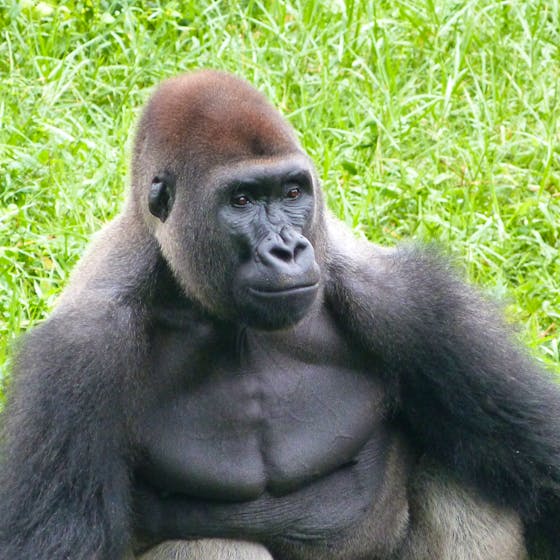
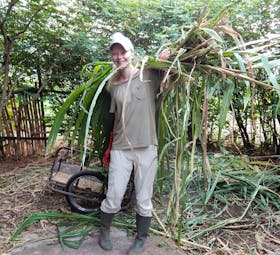
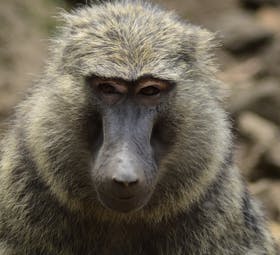
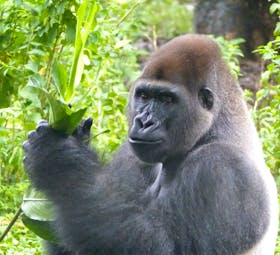
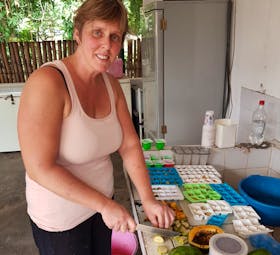

 (11 fältrapporter)
(11 fältrapporter)
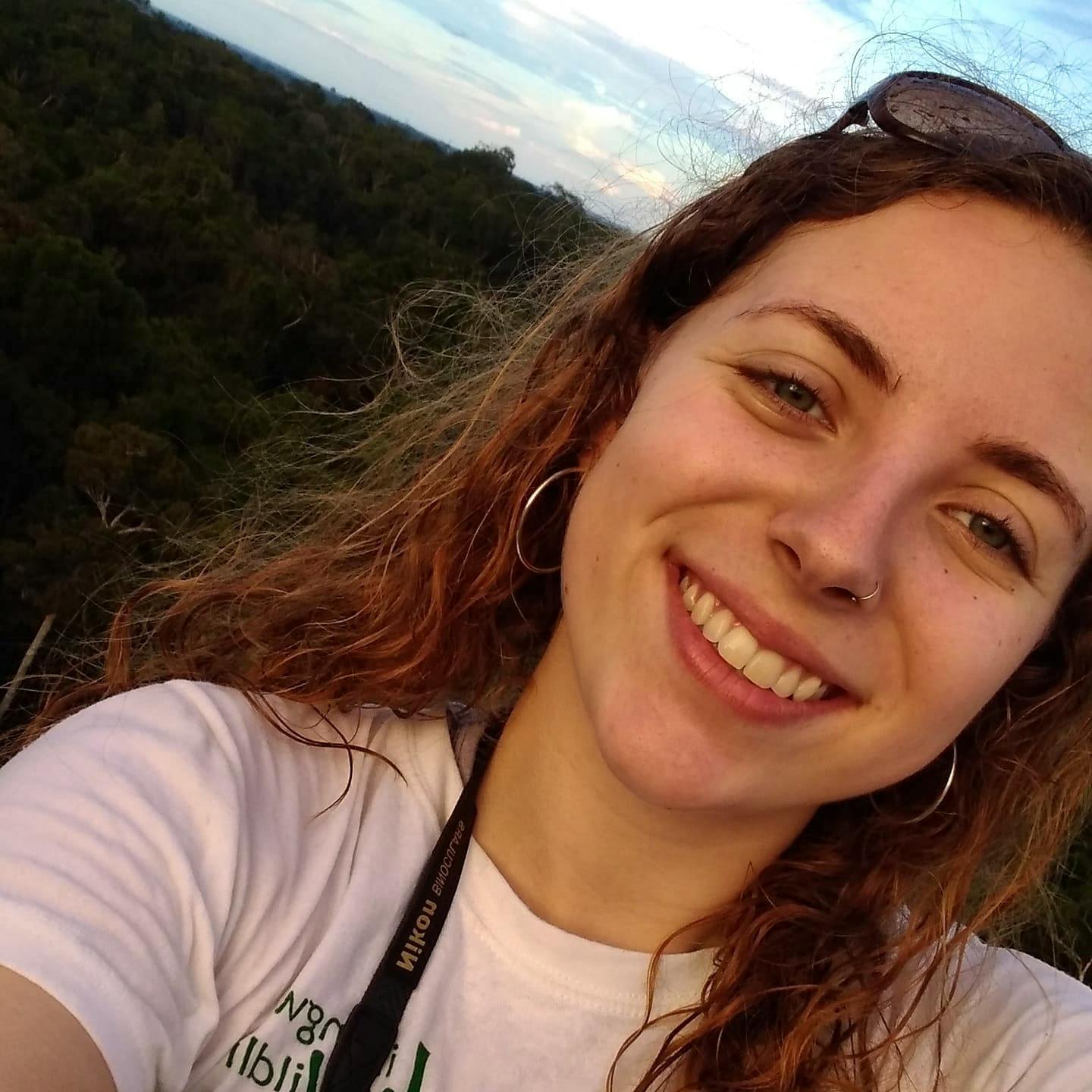
 4.8
4.8

